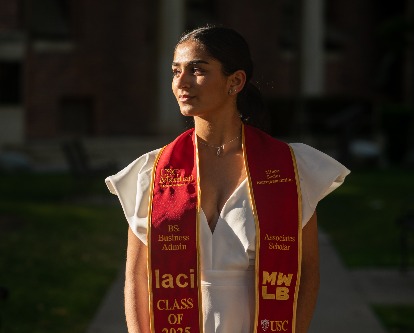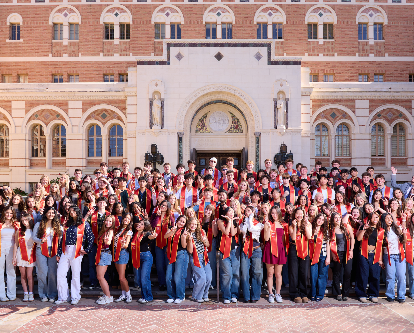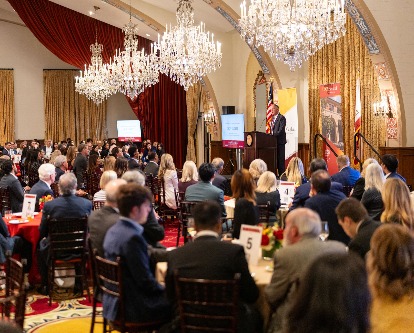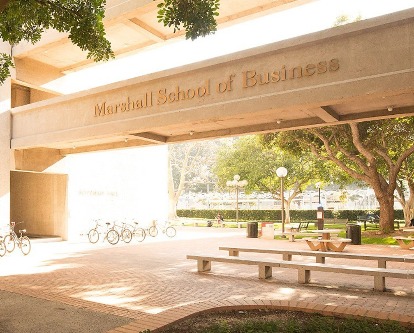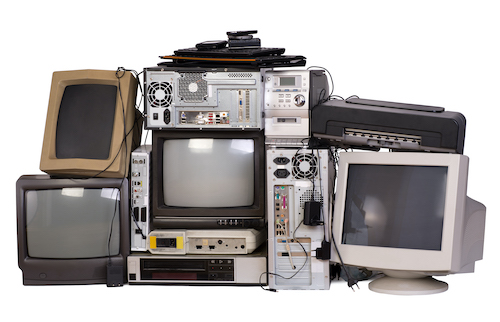 Ever wonder what happens to your old work computer when the IT department announces it’s being replaced with a newer model? If you work at USC, chances are that computer is going on to a second life as a much-needed piece of technology for a needy family who wouldn’t otherwise be able to afford it.
Ever wonder what happens to your old work computer when the IT department announces it’s being replaced with a newer model? If you work at USC, chances are that computer is going on to a second life as a much-needed piece of technology for a needy family who wouldn’t otherwise be able to afford it.
The company that will come and retrieve, refurbish and redistribute that technology, human-I-T, is a Long Beach-based nonprofit. In its seven-year partnership with USC, it has kept one million pounds of used electronics out of the e-waste stream, by collecting USC’s old technology, most of it only a few years out of date, refurbishing it and redistributing it locally, helping bridge the so-called digital divide.
More than 80 million Americans lack access to the internet in their homes because of the costs. At the same time, Americans dispose of 150 tons of e-waste every day. E-waste is the fastest growing source of toxic waste in the world, according to estimates.
“We started this company because we wanted to solve both problems pragmatically,” said co-founder Gabriel Middleton.
Chance Meeting
A chance meeting on the USC campus with an IT manager from the business school led to the startup getting its first big client—USC.
Gabe Middleton was on the USC campus when he ran into a man pulling a trolley full of old computers to storage. Middleton and his co-founder James Jack had just launched their startup—then called Computers for a Cause.
The man pulling the computers was Patrick Cates, who today is Chief of Staff for the Marshall School, but in 2012 was the Associate Director of Customer Technology Services for Marshall. The two struck up a conversation, and Cates was immediately piqued with the startup’s concept.
“I usually had to formally pitch people my idea,” recalls Middleton. “But Patrick got it immediately.”
Cates remembered being blown away by the young man’s passion and sense of mission—it went beyond merely wanting his startup to succeed. “They felt strongly that they could make an impact that would not only help people in need, but help the environment too,” he said. “His energy was palpable.”
Was it risky? Maybe. The startup was so new in fact that Middleton and Jack arrived at donation sites and loaded the old equipment themselves into their own trucks. “We had $800 to our name,” recalled Middleton, “We couldn’t even afford pallets to transport and store the equipment on.”
There were other recycling companies that would take the old equipment—but they didn’t refurbish and redistribute locally. The green and sustainable cycle built into their business model was particularly appealing to Cates, who was in the position to make the decision to work with the startup.
That vote of confidence by Marshall paved the way for human-I-T to win a vendor contract for all of USC, its first major university client, a year later.
Today human-I-T remains locally rooted, but has expanded its operations nationally. With headquarters in Long Beach, the company employs 160 workers and has warehouses in East Los Angeles and Detroit. Besides collection, wiping and refurbishing and redistributing tech, it also runs classes for those new to computers and the internet, as well as a low-cost ISP.
“You may get a refurbished laptop to a low-income senior, but then they have to be able to get online,” said Middleton. “Those costs play a role in the digital divide.”
Growing Demand
The challenge now is not finding “a room full of tech” anymore—it’s hiring enough people to meet the demand for its services.
As the pandemic shut down the country, donations plummeted, but demand for their services tripled.
“We used to have to pitch the problem, educate people about the digital divide,” said Middleton. “The pandemic put a spotlight on that problem.”
They could barely handle the demand. Overnight students needed to get online to attend classes, download materials and otherwise participate in their schooling. Suddenly, seniors found themselves isolated, with online services such as Zoom the only way to reach out to their loved ones.
Middleton, Jack, and their team had their work cut out for them.
Last year human-I-T received more than 920 tons of e-waste—that’s roughly the equivalent of 73 LA Metro passenger buses!
It also distributed nearly 80,500 devices through its marketplace platforms and to low-income families through grant funded programs and partnerships with community-based organizations and housing providers.
Giving Back
Middleton has returned to the Marshall School to speak to social entrepreneurship students on many occasions at the invite of Professor Adlai Wertman, David C. Bohnett Chair in Social Entrepreneurship and founding director of the Brittingham Social Enterprise Lab. The nonprofit was a beneficiary of a unique class in philanthropy as well…and was able to finance transportation pallets!
Middleton has some advice for entrepreneurs starting out; “You don’t stare out at the abyss. Don’t look up to the top floor when you’re just starting. Try not to trip on the first stair.”
And, do good.
“The world needs more people who want to help other people," he said.
